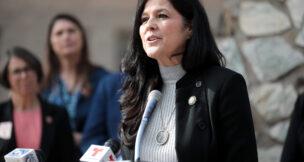Court rejects bid for legislative immunity from Mohave County Supervisor
Howard Fischer, Capitol Media Services//November 7, 2025//
Court rejects bid for legislative immunity from Mohave County Supervisor
Howard Fischer, Capitol Media Services//November 7, 2025//
Key Points:
-
Court of Appeals rejects bid to bar attorney general from subjecting Ron Gould to “intimidation”
-
Court ruled that Gould’s claim of intidimidation is speculative
-
Attorney general’s letter did not constitute a specific threat of prosecution against Gould
The Arizona Court of Appeals has rebuffed a bid by Mohave County Supervisor Ron Gould to bar Attorney General Kris Mayes from subjecting him to what he says are “threats and intimidation” for pushing for a hand count of elections.
In a unanimous ruling, the three-judge panel acknowledged that Gould said he intends to continue voting to have all ballots counted by hand, despite Mayes telling the supervisors that scrapping machine counting “may result” in criminal penalties. But Judge Michael Kelly, writing for the court, said that, at best, Gould was saying this was something he would do in the future.
“His claim does not relate to an existing state of facts, but to a speculative vote the board may or may not take,” the judge said. And that, he said, currently leaves courts with nothing on which to rule.
And Kelly said there’s another flaw with Gould’s lawsuit.
He noted that Gould also wants a ruling that county supervisors are entitled to conduct a complete hand count of ballots, regardless of anything that Mayes has said about the legality of that move. But, here too, Kelly said Gould has no right to seek such a ruling because he has not challenged the law and has not yet proved a credible threat against him.
Gould told Capitol Media Services that the ruling defies logic.
“They keep saying I don’t have standing because she didn’t try to arrest me,” he said. “But she clearly tried to manipulate the outcome of a legislative action.”
All that goes back to a vote by the Mohave supervisors last summer, when the board approved a hand count for the 2024 races. That was scrapped by a 3-2 vote against the plan in August amid various practical concerns, with Gould voting to proceed with the hand count.
But, three months later, board Chair Travis Lingenfelter, who had been one of the foes, put the issue back on the agenda. That gave Senate Majority Leader Sonny Borrelli, R-Lake Havasu City, a chance to argue to the board a hand count would be legal.
It was also at that same meeting, however, that a letter from Mayes was read to the board. She warned the supervisors that going down that path “could result in various felonies and misdemeanor penalties.
“We hope you will choose not to violate the law and thus that it will not be necessary to consider whether criminal prosecution is warranted for conducting an illegal hand count,” the attorney general wrote.
Gould contends that, had it not been for Mayes’ letter, Lingenfelter would have voted for the hand count, providing the necessary third vote on the five-member board, given his earlier vote against it. So he filed suit, asking a trial judge to rule that the use of tabulating machines is not mandatory but optional, that the supervisors can make that choice, and that he “should not be subjected to threats and intimidation by the attorney general for voting to have hand counting be the primary initial method of vote tabulation.”
That, Gould said Nov. 7, should have been enough to sustain his lawsuit and get a ruling.
“It’s an implied threat to begin with, which is why she sent it out the morning of the vote,” he said.
“It seems odd to me that she has to actually arrest me before I have standing, apparently, in the court’s eyes,” Gould continued. He said it was clear from the letter than if he and other supervisors voted for the hand count they would be prosecuted, making it “an imminent threat.”
But Kelly, in the ruling, said that’s not the case.
“The AG’s letter, which provided that criminal penalties ‘may result’ from the board’s vote and that criminal prosecution would be ‘considered’ for ‘conduct(ing) an illegal hand count,’ does not constitute a specific threat of prosecution,” the judge wrote.
In fact, Kelly noted that the board never actually voted for a hand count. And that, the judge said, negates any claim by Gould that the court should give him legislative immunity.
Still, Kelly acknowledged that there are times when courts will take up these issues before someone is actually arrested.
One such occasion was in 2019, when Brush & Nib Studio, which does wedding invitations, challenged the constitutionality of a Phoenix anti-discrimination law. The basis was its concern that its refusal to do that kind of work for same-sex weddings would result in charges against the owners.
The Arizona Supreme Court agreed, voiding the Phoenix law.
But in that case, Kelly wrote, the owners demonstrated “a real threat of being prosecuted for violating that ordinance,” one they argued was unconstitutional, making it legally “ripe” for litigation.
By contrast, the judge said, Gould is not challenging the validity of the election laws.
That difference did not impress the supervisor.
“They say, ‘We’ve made exceptions, but not for you Gould,”’ he said.
Anyway, Gould said, he doesn’t believe there’s any need to mount a constitutional challenge as he doesn’t believe Arizona law actually mandates the use of machines to count ballots.
“It gives us the authority to use electronic machines and levy a tax to pay for a machine,” he said. “But it never says you can’t do a hand count.”
If nothing else, Gould said, the statute is unclear.
“And the court doesn’t seem to want to get into it,” he said, saying he does not know whether he will seek review by the Arizona Supreme Court.
That claim of lack of clarity stems from a section of the Election Code which says ballots or votes “may be cast, recorded and counted by voting or marking devices and vote tabulating devices.”
During a court hearing, Dennis Wilenchik, Gould’s attorney, said the operative word there is “may,” meaning he said that “the use of vote tabulating devices is optional, not mandatory, under the statutory scheme.”
But Assistant Attorney General Emma Mark disagreed.
“Title 16 (the state Election Code) does not permit a county board of supervisors to authorize counting ballots by hand instead of using electronic tabulating machines,” she argued in court.
Mark acknowledged that there is that provision in the code that some ballots will be counted by methods other than tabulating equipment.
For example, she said, the law permits a hand count “if for any reason it becomes impracticable to count all or part of the ballots with tabulating equipment.”
“But simply because the statutory scheme recognizes that situations will arise which may require ballots to be hand counted, it does not open the floodgates for counties to ignore the procedure detailing when a hand count is authorized and to conduct a hand count in the first instance,” Mark said.














































